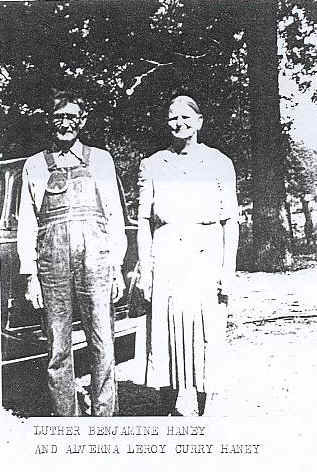Luther Benjamin Haney
Post Office: Dougherty, OK
Field Worker, John F. Daugherty
December 9, 1937
Interview #: 9415
Address: Dougherty, OK
Born: February 4, 1874
Place of Birth: Boggy Depot, Choctaw Nation, Indian Territory
Father: Hiram P. Haney, born in Illinois
Mother: Sarah Gwynn, born in Illinois
My parents were Hiram P. Haney and Sarah Gwynn Haney, both
born in Illinois. Father was a farmer. There were seven
children in our family.
My parents moved to the Territory from Illinois in 1874 in an ox wagon.
They settled at Boggy Depot and it was here that I was born,
February 4, 1874. They traded at Boggy Depot and Stringtown.
These merchants freighted their goods in ox wagons from Sherman and
Denison.
My two oldest brothers worked for T. L. Wade, a big cattle man.
They trailed cattle into the Comanche country.
There was a camp at Marlow where cattle men stayed when driving cattle
over this trail. In the earlier days outlaws had dug some dug-outs about
fifty feet in length, with an opening at the rear, through which they
could escape, if trapped from the front. These dug-outs were used by
the cowboys later. My oldest brother was the cook for this bunch
of cowboys. On one trip they drove twelve thousand head of cattle
from Texas into the Comanche country.
The chuck wagon had a grub box fastened to the rear and a board dropped
down, with one leg to hold it up. This made a cook table.
They used cow chips for fuel. These were easier to get than wood,
and there were plenty of them.
During the time that we lived at Boggy Depot there was only one white
family besides us who lived in that neighborhood.
I can remember when old Oklahoma was being settled. The houses were
built of sod. They plowed the sod up in layers, cut into blocks like
rocks and laid them one on the other, as if they were bricks, for the
walls. Some poles were put across from one wall to the other and the
roof was made of sod blocks. In the spring the grass would sprout
and grow and the small houses were green. The windows were just
wooden shutters, and the chimneys were made of sticks and dirt. The
doors all swung on the outside and were never locked, except with latch
strings. People didn't steal from houses in those days. Cattle
and horses were stolen but seldom one's personal belongings.
I was married to Allie Curry in Texas in 1895 and we settled on Red
River south of Thackerville. We lived near the ferry on the road to Gainesville.
Nearly everybody hauled their cotton to Gainesville and the ginners paid
the ferry fee of 25 cents per wagon to get trade from the Territory side.
When Mr. Overton was Governor of the Chickasaws he had his militia
put people across Red river when they refused to pay the permit. The
militia often passed our house driving people into Texas. As soon as
the militia had departed the people whom they had driven out, turned
around and drove back to the Territory and went back to their s to
live
until the permit collector came again.
I remember the first buggies. They were not painted. They were
the color of the hickory from which they were made. They were a
great improvement over wagons and we thought we were almost flying through
the air as we drove along in a buggy.
Then when the automobile appeared it was breath taking in its splendor.
One boy in Dougherty saw the track of an automobile after it had passed
through town, and decided it was a huge snake. He got a club and
followed it for several miles. He wanted to kill a snake that made a
track that large.
I have lived in Dougherty since 1902. We are the parents of eight
children.

Photo courtesy of Deborah Haney
Transcribed by Dennis Muncrief, November, 2000.